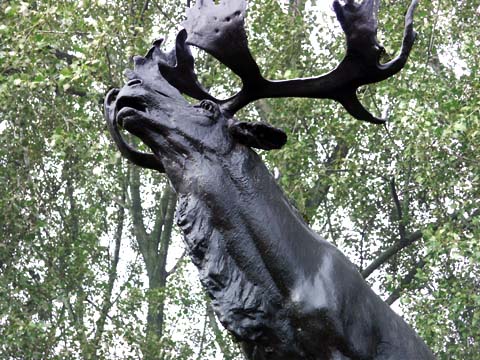Newfoundland Regiment
Memorial at Harlebeke
The Courtrai Memorial in Belgium, just outside Kortrijk (Note the modern Flemish spelling of the town's name) on the road to Gent, is the only caribou memorial in Belgium.
It can be found at the western edge of the town of Harlebeke and that is the easiest way of getting there.
The bronze memorial commemorates the Royal Newfoundland Regiment's crossing of the River Lys.

History
When the Germans launched their last great gamble in April 1918 - the Kaiserschlacht - the Royal Newfoundland Regiment were involved in defensive actions throughout the Battles of the Lys.
In September they were transferred to the 28th Infantry Brigade, 9th (Scottish) Division, with whom they served for the remainder of the war.
The next few weeks of the war found the Division advancing over territory east of Ieper that had been won at great cost in 1917 and then lost so suddenly again earlier in the year.
Following a short period of reorganisation whilst the heavy guns and other logistic support was brought up the general advance resumed on 14 October 1918 with the Battle of Courtrai.

On the northern flank of the 2nd Army the 9th Division found itself with an enormous distance to cover before it could begin fighting in earnest. The Royal Newfoundland Regiment's objective was the railway running north from Kortrijk - eight kilometres from their start line.
As the battalion advanced they had to deal with a number of German pillboxes and at one point shelling by German artillery threatened their entire advance.
Private Thomas Ricketts VC
Private Ricketts volunteered to go with his section commander and a Lewis gun in an attempt to out-flank an enemy battery causing casualties at point-blank range. Their ammunition was exhausted when still 300 yards from the battery and the enemy began to bring up their gun teams.
Private Ricketts doubled back 100 yards under the heaviest machine-gun fire, procured ammunition and dashed back again to the Lewis gun.
They then drove the enemy and gun teams into a farm and the platoon was able to advance. They captured four field guns, four machine-guns and eight prisoners.
Thomas Ricketts a 17 year old became the youngest winner of the Victoria Cross in the British Army. He survived the war returning home to become a pharmacist.
Over the next three days the British tried to get across the Lys but were repulsed - the Newfoundland Regiment suffering heavy casualties. It would not be until the small hours of 20 October that the Regiment would be able to raft across as three Divisions finally managed to force the canal and river.



